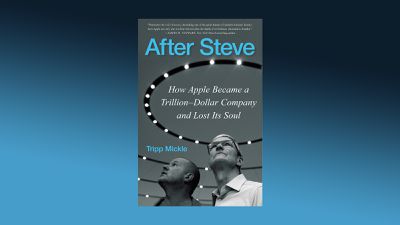Tripp Mickle, a technology reporter who recently moved from The Wall Street Journal to The New York Times, is releasing a new book on Apple this week, entitled "After Steve: How Apple Became a Trillion-Dollar Company and Lost Its Soul," and an adapted excerpt of the book was shared today that provides a look at the tensions between Tim Cook and Jony Ive that ultimately led to Ive's departure.

The main anecdotes in the piece focus on the Apple Watch, which Ive wanted to be a fashionable accessory launched with all of the glitz of a runway show complete with a $25 million white tent. Apple's marketing team questioned the expense and the emphasis on fashion, preferring a more traditional introduction focused on the Apple Watch's capabilities.
While Cook ultimately sided with Ive on the fashion-oriented introduction, sources interviewed for the book suggest it was the beginning of the end for Ive's time at Apple.
To many present, Mr. Cook’s approval seemed like a win for Mr. Ive. But the designer would later recast it as a Pyrrhic victory. He would tell colleagues that the debate over the event and the larger struggle over the watch’s marketing were among the first moments that he felt unsupported at Apple.
As the Apple Watch was pivoted to become a fitness-oriented device with broad retail distribution, Ive reportedly began to chafe at the "rise of operational leaders" within the company and an increasing emphasis on services rather than hardware, and ultimately he transitioned out of Apple to found his own design firm, Lovefrom.
The piece goes into more detail on Ive's early days at Apple, his relationship with Steve Jobs, and additional anecdotes on Ive's evolution following Jobs' death.
Without Mr. Jobs, he had assumed much of the responsibility for the product’s design and its marketing. People close to Mr. Ive said he had found it draining to fight with his colleagues over promotion and had become overwhelmed by managing a staff that stretched into the hundreds, multiples of the 20-person design team he ran for years.
Cook and Ive ultimately agreed on a new Chief Design Officer role for Ive that would see him turn over daily management of the design group and shift to a part-time role laser-focused on product development.
Ive's participation and presence waned with his new role, with Ive reportedly often going weeks without weighing in on work going on in the team. The report includes an anecdote from the iPhone X development process when Ive called an important product review meeting that he ended up being nearly three hours late for and ultimately concluded without making any final decisions.
In Ive's absence, Apple continued to pivot more toward services while Cook's eye for operational efficiency evolved the company even further. With Apple Park essentially finished in mid-2019, Ive decided it was time to move on.
Few knew the full extent of Mr. Ive’s battles. Few were aware of his clash with Apple’s finance team. Few understood how draining he found it to fight over marketing the watch, a product that had increased sales over time and become core to the company’s $38 billion wearables business. Yet many could recognize the tediousness of annually updating the company’s iPhones, iPads and Macs.
A review of After Steve by The New York Times praises it for Mickle's thorough efforts to interview over 200 former and current employees and advisors. It takes issue, however, with Mickle's epilogue that places blame on Cook for being "aloof and unknowable, a bad partner for Ive" and largely responsible for Apple's failure to launch another product on the scale of the iPhone. The review argues that the iPhone was a singular opportunity as evidenced by the fact that the Jobs–Ive partnership never yielded anything else on that scale, either before or after.
"After Steve" debuts this Tuesday, May 3 in the U.S. and is available from Amazon and other retailers.





















